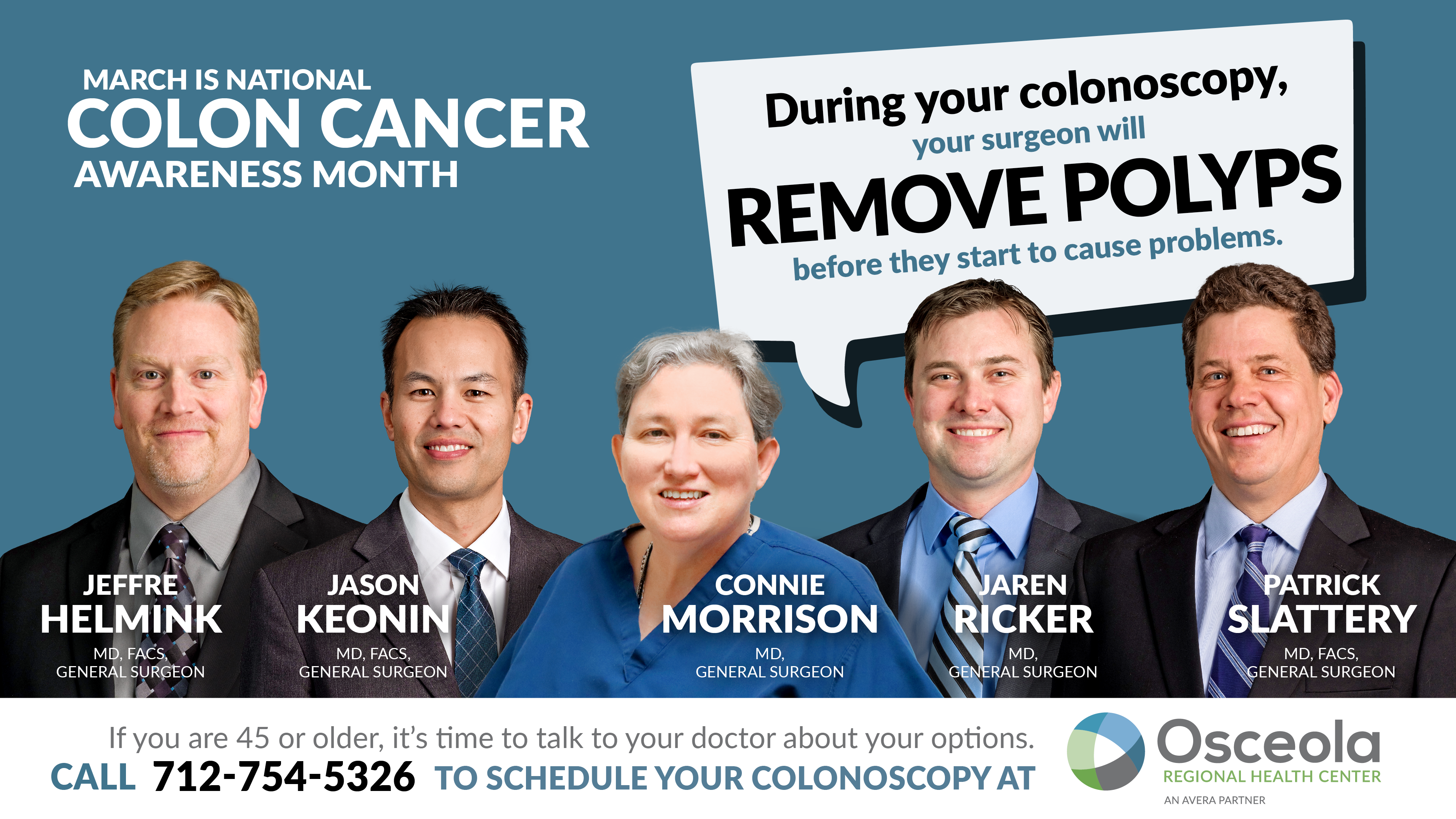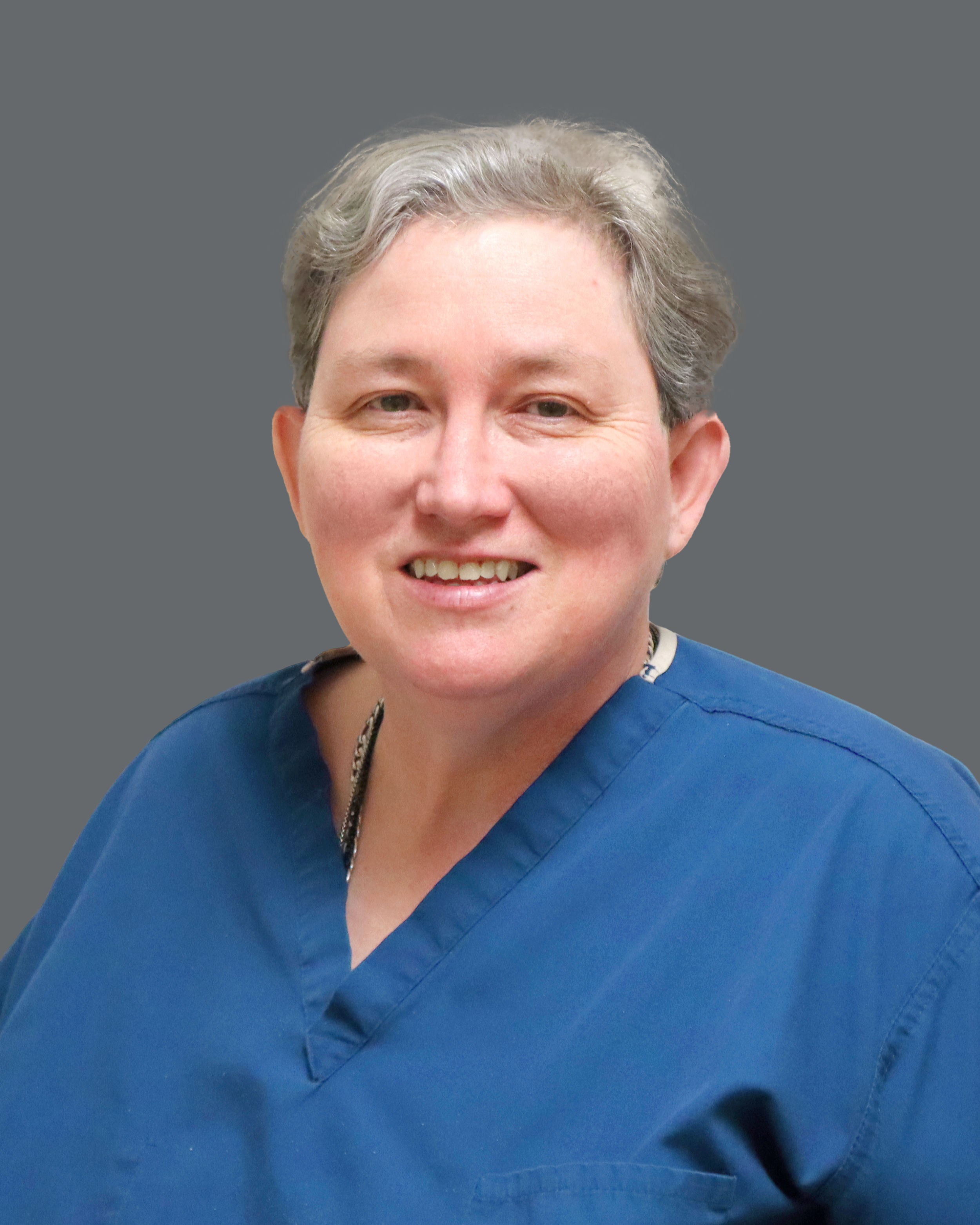
The scope at Osceola Regional Health Center is smaller and more flexible than some standard scopes, which increases the viewability of the entire colon.
Colon Cancer is considered highly treatable and often curable.
By Dr. Connie Morrison, MD, General Surgeon

Dr. Connie Morrison MD, General Surgeon
March is National Colorectal Cancer Awareness month… and last month was Heart Month…and next month will be…
There is a great reason for all these national health observances. It’s to increase awareness and more importantly to encourage people to become their own advocates.
If you are 45 years old, you should already be talking to your doctor about screening options. If you have some health issues or have a family history that would put you at a greater risk, you should be talking to your doctor sooner. Early diagnosis of any cancer is very important. It gives our patients the best chance for successful treatment. That is absolutely true with colorectal cancer which is largely preventable, treatable and beatable.
I know getting a colonoscopy isn’t exactly at the top of everyone’s list. It’s awkward and the cleanse doesn’t sound like a good time on a Sunday afternoon, but it’s not something that should be avoided because it can save your life.
Be your own advocate and talk to your doctor about your screening options.
In honor of National Colorectal Cancer Awareness month, Osceola Regional Health Center will be giving a free month membership to their Wellness Center to every individual who receives or schedules their colonoscopy during the month of March.
Call Avera Medical Group Sibley at 712-754-3658 to schedule an appointment to discuss your screening options today.
Frequently Asked Questions:
What are some colon cancer symptoms to look out for?
Colon cancer often develops silently, with no early symptoms. If you are experiencing any of the symptoms below, it’s important to see your doctor.
- Bowel habit changes like diarrhea, constipation or narrowing of stool that continues for days
- Bloating or a feeling like you need a bowel movement that isn’t relieved by going to the bathroom
- Pain, tenderness or cramping in the lower abdomen
- Rectal bleeding, blood in the stool or dark stools
- Unintended weight loss and fatigue
How is colon cancer found?
- Colonoscopy
Completed every 10 years
It is a procedure that allows the surgeon to examine your whole colon. It’s the only exam that can find precancerous polyps in your colon before they grow and become cancer. At the time of the exam, the surgeon can remove these polyps before they start to cause problems. - At-home Stool DNA test
Completed every 3 years
It is a non-invasive test that can be completed at home with no prep required. It detects specific DNA alterations and blood in the stool that may indicate colon cancer or precancerous polyps.
A positive result would require further testing ( a colonoscopy ) to see if it’s a false positive or if there is a cancerous growth or pre-cancerous polyp that’s causing the positive result. While we explain to our patients that colonoscopy is the preferred screening, we know that some people who will never choose to have a colonoscopy are willing to do an at-home test.Any screening is better than no screening.
What is the colonoscopy prep and exam process?
When you schedule a colonoscopy, you’ll be given instructions and medication for colonoscopy prep. This is important, because it cleans out the colon for an accurate exam. Colonoscopy prep is something you do at home the day and/or night before, and while it requires time in the bathroom, most people have few problems. When you come in for your exam, you are given sedation medications that make the test painless and comfortable. In fact, you probably won’t remember much about it. You’ll need a ride to your exam, and a ride home, but in a couple hours, you’ll be back home, and done.
You can have a nice meal and rest easier, knowing you’ve taken this important step in colorectal cancer prevention.
Even if you’re dreading the exam and the prep, remember that preventing colon cancer can save you from cancer treatment, including surgery, chemotherapy, and/or radiation therapy
Who should get screened?
Colon cancer screening is recommended for everyone – both men and women – age 45 and older. Colonoscopy should happen every 10 years unless recommended more often; so if it’s been 10 years since your last exam, it’s time to schedule your next one. Some people younger than 45 may be eligible for colon screening, if they have risk factors including a history of colon cancer in the family. If you’re unsure what’s right for you, have a conversation with your primary care provider about colon cancer screening.
What can I do to reduce my risk of colon cancer?
You can help reduce your cancer risk by getting more exercise and eating a better diet, including less red meat, more whole grains and more fruits and vegetables. Moderate your alcohol use and quit smoking. Leave processed products on the shelf. Every small step adds up reduce risk.
Yet colonoscopy is a big step in cancer prevention that you don’t want to skip. During your colonoscopy, your surgeon will remove polyps. Some polyps are benign and haven’t developed into cancer yet while others may be cancerous. Make an appointment today with your primary care provider for your yearly checkup and talk about your colon screening options. Today’s the day to make these potentially life-saving decisions. Any screening is better than no screening.
